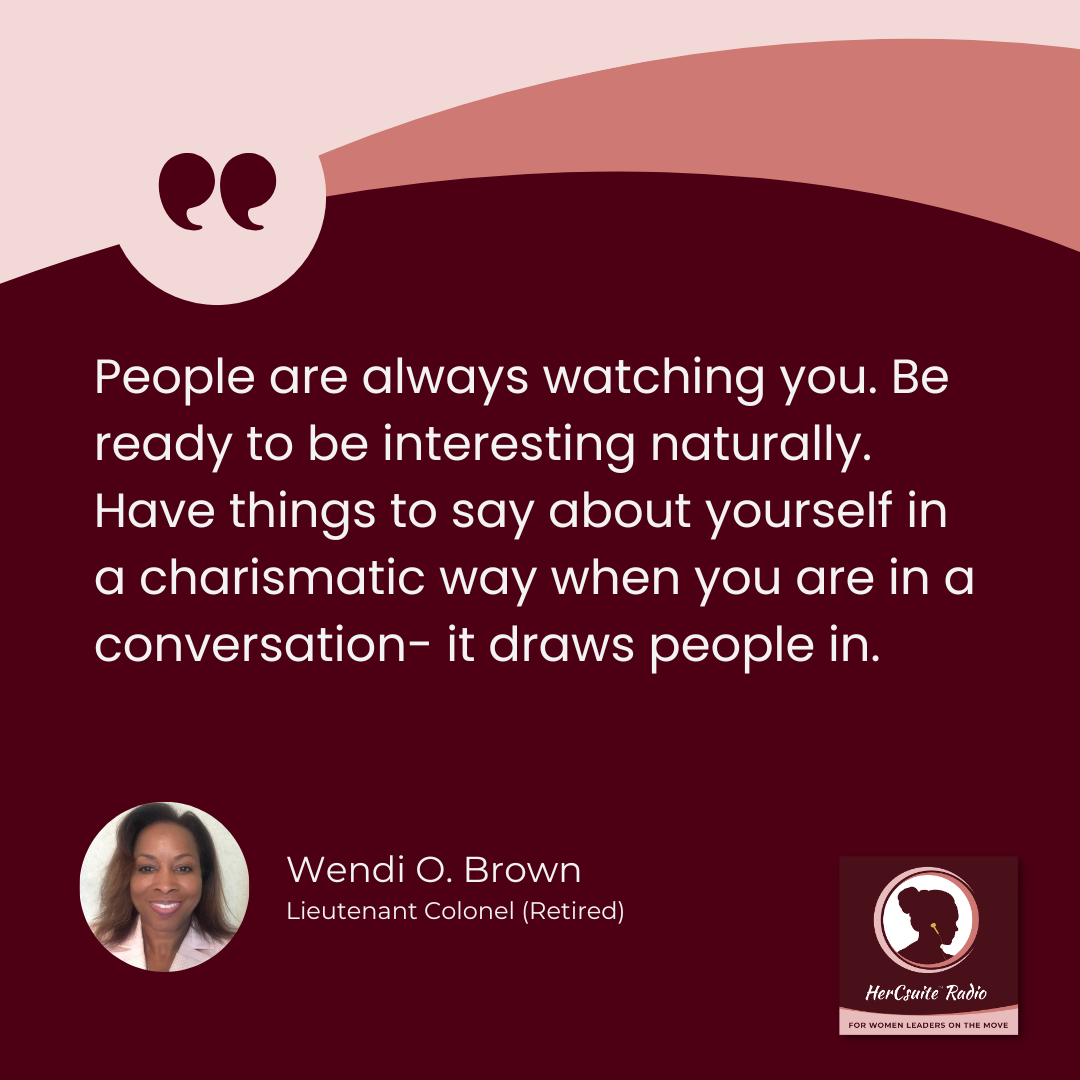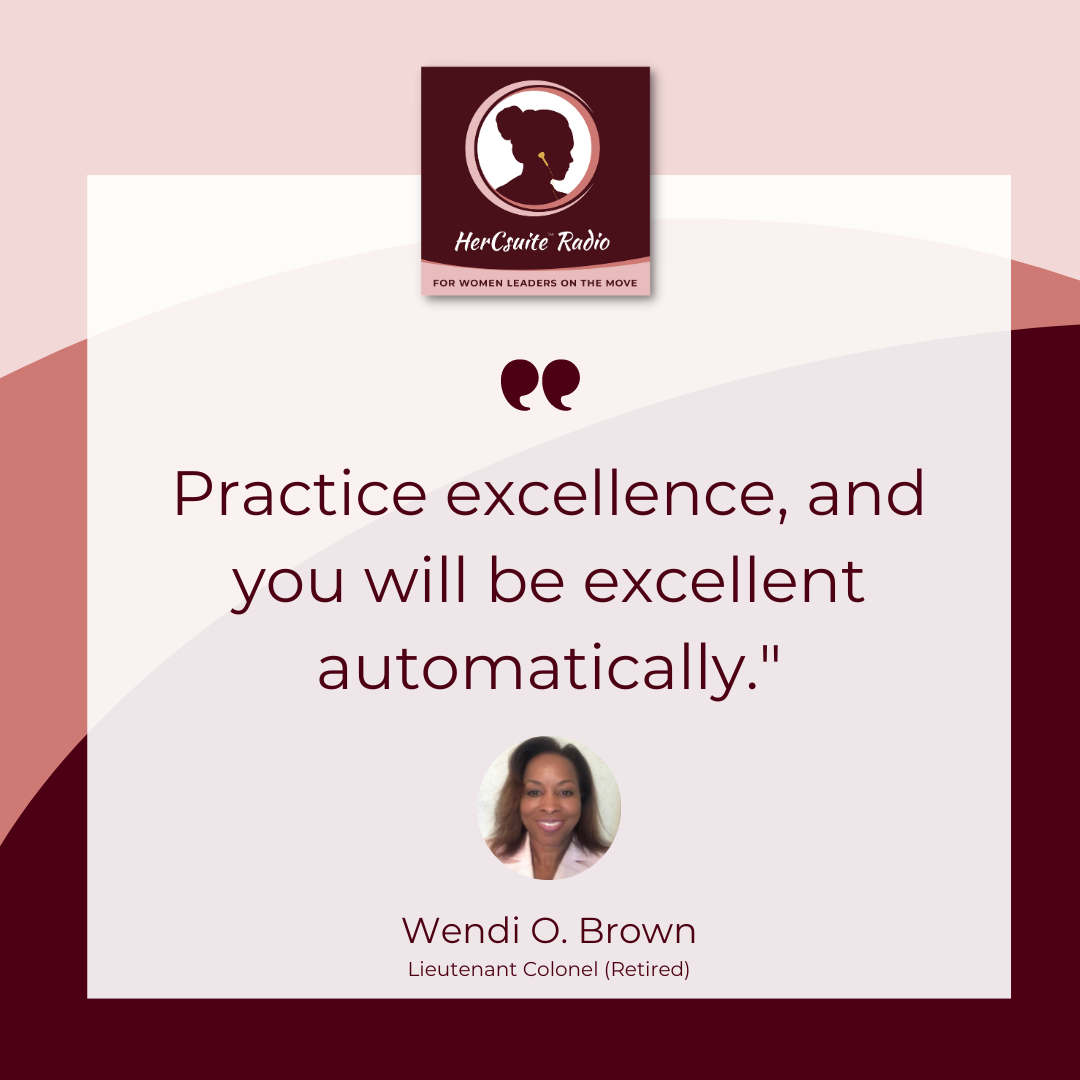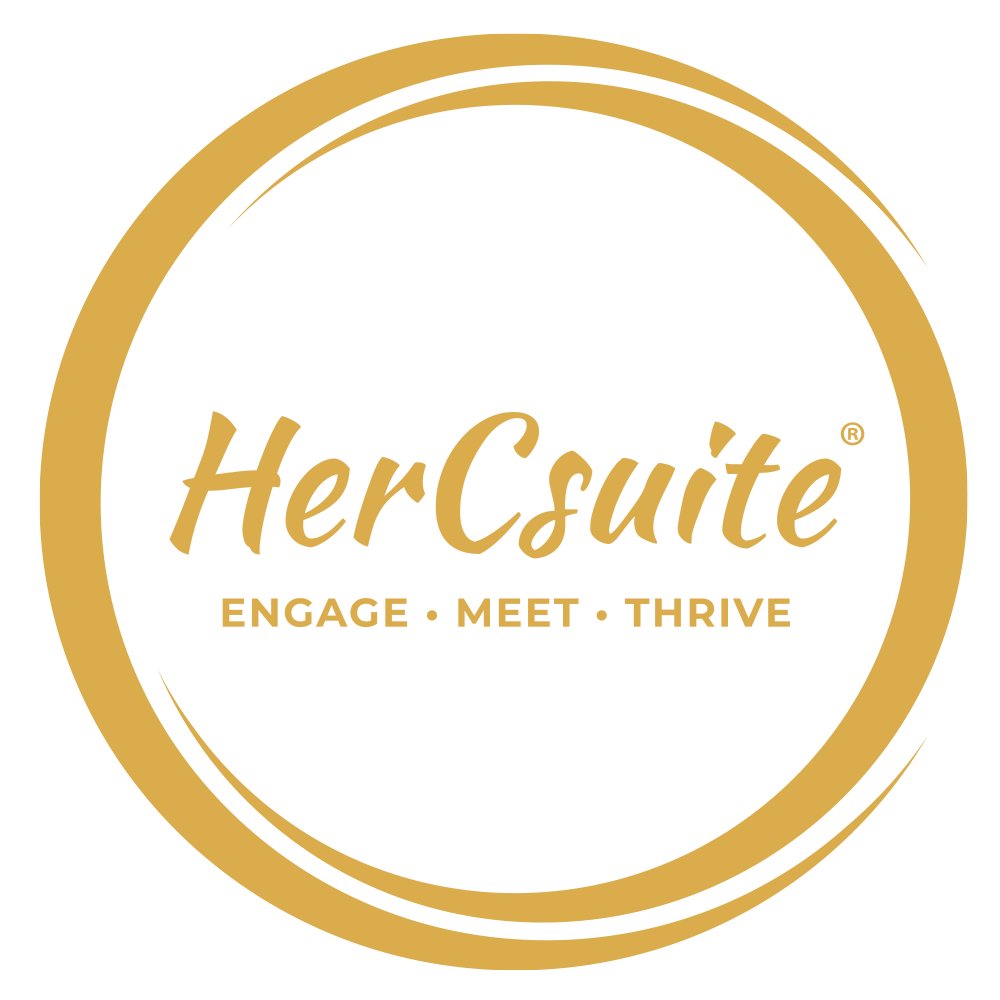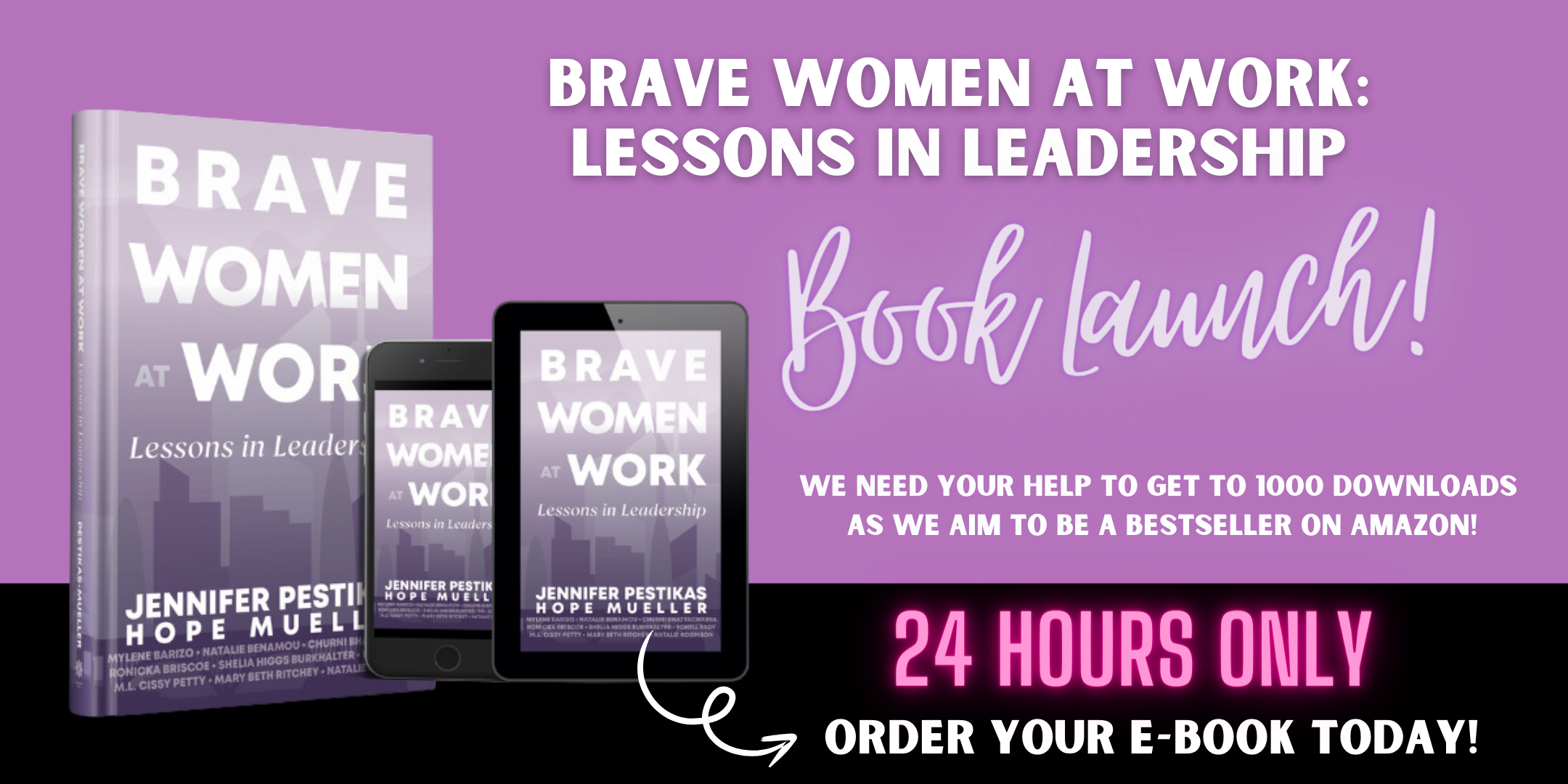The POWER of Being Intentional with Wendi O Brown
Have you ever experienced a time when you felt your career advancement was hindered? You are not alone. In this interview with Wendi O. Brown, Lieutenant Colonel (Retired) shares incredible tips, insights, and actions that she took to create opportunities to grow her career. Find out how the power of being intentional not only advanced Wendi's career, it led her to pursue being an expert in Cyber Security and achieve two master's degrees.
3 Power Tips To Be Intentional and Advance Your Career
- Be ready for opportunities. Practice your elevator pitch and be ready to respond to introductions with a charismatic and engaging response.
- Dedicate time to learning. If you see a new trend, explore what you need to do to become a subject matter expert.
- Believe you have everything you need to create a new way to solve challenges and share that knowledge with confidence.

In this engaging episode with Wendi O. Brown, you will discover how she learned about Cyber Security and received two Master's Degrees. Wendi shares the moment she realized Cyber Security would be a growing field.
Find out how you can evaluate opportunities and expand your knowledge to become an industry expert like Wendi O. Brown.
Discover Wendi's examples of leadership, grit and how being intentional in your career will lead to big opportunities.
Strategies to Leverage Your Communication Skills with Senior Management to Protect Your Position in The Workplace:
Effective communication is key to safeguarding your position at work. Start by aligning your conversations with management to the company's goals, showing you understand the bigger picture. Regularly update leadership on your projects' progress, highlight how it contributes to overall objectives. This not only illustrates your competency but keeps you on their radar.
Demonstrate your problem-solving skills through effective communication. When issues arise, bring them to management's attention along with proposed solutions, rather than just complaints. This portrays you as a proactive, solution-oriented employee.
Additionally, articulate your career aspirations, showcasing your long-term commitment to the organization. This also helps management consider you for future opportunities that align with your growth path.
By leveraging communication strategies, you can strengthen your relationship with management, enhance your visibility, and fortify your position in the workplace.
Wendi delivered one of the most popular presentations about Confidence and Visibility. Thank you Wendi O. Brown for being a featured guest and speaker for HerCsuite™ mentorship program.
HerCsuite™ Radio is sponsored by HerCsuite™ Leadership Development programs and Circle 8 Mentorship Program designed to advance women at every career phase. Schedule a call and learn how you can advance more women in your organization with HerCsuite™ Mentoring Programs.
HerCsuite™ Founder and Podcast Host Natalie Benamou can be found on LinkedIn | HerCsuite™ LinkedIn | HerPower2 LinkedIn
Thank you for listening to the show and shining your light out in the world! We would be honored if you subscribed and shared this episode with a friend or colleague today.
Resources:
SHOW TRANSCRIPT
Natalie:
Welcome to HerCsuite™ Radio for women leaders on the move. I'm your host, Natalie Benamou, and every week, I bring new inspirational stories and valuable insights to help you advance in every phase of your life and career. Today, we're talking about both, and I'm so thrilled to be bringing you Wendi Brown, Wendi is not only a motivational speaker, but she's also a featured speaker for HerCsuite™, as well as a valued member. Her illustrious career has seen her rise through the ranks to advise the highest levels of leadership in the US Military. Now she is leveraging her expertise to speak publicly for people that are ready to transform and take their careers to the next level. Her program was one of the favorites in our mentoring program. And I think when you hear this episode, you'll understand why, so let's get started now. Wendi, I'm so excited to welcome you to HerCsuite™ radio today. Thanks for being on the show.
Wendi:
Oh, I'm so happy to be here. Thanks for having me. I have the benefit of getting to see you twice today. I got to see you this morning and our board circle. And now today. And that's a gift. So thank you for the opportunity to see you twice. It's my pleasure. I always start with this one question. And then we're going to take a path, we're going to go down the path of all the questions I have for you, because I've had many that are going to help our listeners. But for those who don't know you, can you share a little bit about your background, your career, and the arc of your career, which just had a big change to bring us to this moment today?
Wendi:
Sure. So I have just retired after 23 years in the US Army Reserves as a Lieutenant Colonel. And I've spent the last eight years living in Europe, particularly Germany. And so now I'm back in the US and getting readjusted to America. You know, it's wonderful, I've definitely missed my country. And I have really just honed in on focusing on my professional and personal growth, having gone through the journey of being in the military, the good, bad, and the ugly. But it all helps my higher self. So no regrets and really look forward to sharing the knowledge and experience that I have with the public.
Natalie:
You have had such pivotal moments that you shared in our mentoring program for Horizon mentees, and they really loved that program, because it was so inspirational, but also relatable to these situations that we find ourselves taking advantage of the moment because I think we don't see the opportunities that are before us. And you've been really intentional about those opportunities. And one of them stands out to me, which is a story you shared about a holiday party, and intentionally preparing for it, what happened? Can you share that stories? I think that's going to set the stage for a few other questions I have for you.
Wendi:
Yes. So this was when I was a captain. And again, I'm in the Army Reserves, which means you pretty much do your mandatory eight years, then you can get out. So I was in uniform working in Crystal City, Virginia, under the Pentagon. And our Goldberg Colonel had invited everyone to a Christmas party at his house. So me being the lowest rank there, you know, I went, but before I went there, I talked to my mentor who told me how to carry myself saying this is a Christmas party, from people at work. This is not a party with you and your friends, like you and your fellow Captains, you're still at work. Always have some topics to talk about, and not sound mechanical, but conversational, so that it's personable so that you can interact with one another.
I had always prepared in my mind for this particular tour. I used to be with the Army soldier show, and pretty much traveled throughout US and Europe. So that was one of the things I'm always prepared to talk about that make me stand out a little bit differently from my peers. So went to the Christmas party and didn't know anyone because these were like high rent either they were high ranking or they were friends of high ranking, I'm lonely Ole Captain, which means I'm nobody. And I just still show up. That's key in this story is about showing up. So my captain starts talking to me, and I just told him I didn't know who he was. Didn't know his position or anything. So we start talking, and then all of a sudden, he asked me, What do you know, what are the traditional, which are rank, what do you do? And then anything interesting about yourself. I started telling him about my travels, and how appreciative I was about the military. And I even went over for several minutes. And so after that, the conversation ended, I walked away and started mingling with other people. Then my boss, who was a full bar Colonel came over to me and said, Come on, I want to talk to you. And I was like, Oh, my God, what did I do? I was on my best behavior. I made sure I didn't drink too much. I didn't curse, you know, I was on my p's and q's. So what could I have done, he took me into his kitchen, where the gentleman I was talking to previously, and told me that he was so impressed with how I conducted myself because remember, I'm the lowest ranking person there, that he offered me a job. And there was this awkward silence because I did not understand that things like that happen. And it was just, quiet. My boss had to repeat himself. You have a job, you know, if you want, you can leave the military right now you have a GS job. And I was just, wow, I didn't even know how to respond, because I was so blown away. I remember I said, sure. And so I ended up talking to my mentor later that night, and it worked! What you said was right, if you know how to carry yourself, because what you don't know, you don’t know who you're talking to. But if you know how to carry yourself and have things in the back of your mind, to have a conversation about to make you interesting, and we all are interesting, it's just that we don't know how to really sell ourselves. But then you know, that makes you entertain this show how professional you are, how much you are assertive and getting the job done.
It worked. And I was so thrilled. Days later, went to work toward the other officers who outrank me. I got a job offer. And they snapped at me. Oh, you must have been brown-nosing. No, I was not, I didn't know who I was talking to. But it had sparked a little bit of jealousy. Of course, I loved it. But it just comes to show you that people are always watching you. And that's one of the things my mentor told me, you're always on, you're always interviewing. Unless it's one of your closest friends that you grew up with. You're now in the neighborhood, you're always interviewing. So just be that way naturally have interesting things to say about yourself naturally in a charismatic, very conversational way, it draws people in. And like I said, that was many moons ago, but I still remember it to this day, and I've never forgotten it. Even though something has party at the end of it. It's still work. And people are still watching you. As a matter of fact, I think they're watching you more than you are at work because at work, we're always on pretty much your best behavior. When in the social setting, how do you carry yourself? That was a great moment for me.
Natalie:
I can only imagine, and I think some of the things that come to mind about it is being ready, is that something because you work with your mentor or being in the military being ready, being prepared? A lot of people aren't people that think I'm going to wing it. You know, I talk about this all the time that people think, oh, you know, you don't prepare, you seem so natural. When you're interviewing people or moderating or whatever. Oh, I practice before this. I was like, okay, I'm going to get on. I'm talking to Wendi, I have to be…
Wendi:
Absolutely, I think people underestimate how important it is to be prepared.
Natalie:
What are some of the things that you do for those situations to be ready? What do you have like mantras? Do you have things that you tell yourself? What do you do?
Wendi:
So let me just say another story. Well, just a big-picture story. As a captain you get approached by a general, you better have something to say other than just mouth wide open and all you can say is your name. Let me tell you, you will get killed for that. So probably because of my military training, we are taught you better know how to speak and when a higher officer talks to you, you need to know how to have a conversation. Have a few things off the top of your head that you can talk about and sometimes practice whether it's formal or informal. So I learned early on in my career, the power of conversation, I am telling you that is a game changer. That's not something you're going to learn in grad school, undergrad, anywhere. But I tell you, it's a strong tactic. And strategy is the power of conversation because it can bring people into you. And let's be honest, when it comes to jobs, it's about the best fit. It's about the best fit. If you don't fit with that culture, even if you're technically competent, you don't get the job. And even if you do, you don't survive. So I've learned at an early age, the power of conversation, and sometimes generals will approach you just to see if they can throw you off your game, it's a task, so it's constant. And they don't always do it during the workout, like I said, sometimes it's during social activities, that's when they really can get you. And so that's when it really shows, you know, that you know, the adults from the children who can handle it when you least expect it. Now, in the beginning, you might get embarrassed a couple of times because you're a captain. But once you become a senior captain, especially a major, you need to know that at that point, if you can't talk to a general officer, something is wrong. So you're groomed for it. And that's the power of conversation, just stop thinking about two or three things that make you so interesting that you can elaborate on them without having cards, or even if you're nervous, it'll just come to you naturally, even right now. And one of the things people ask me is, yes, I've been living in Europe for the past eight years, these are some of the places I've traveled. That can just start a whole conversation for the next 30 minutes. Of course, you wouldn't talk to anyone that long, but it's always having something planned in the back of your head. Once you consistently do that, it'll become natural and normal, just like you prepare for this interview. So that I wouldn't even think about winging it is totally not my skill set. And if you practice winging it, you're going to practice being average, if you practice excellence, then you'll be excellent automatically.



Natalie:
Another story that you've shared that I really like is about the intentionality that you had. And you talk about a situation with a boss where you were kind of being blocked a little bit from making progress and talking about conversation, you sought out to have a conversation with someone to stand out, and you were ready for it. What did you do to prepare for that? And can you describe what happened? Because I think that intentionality is something that we all can benefit from really thinking through.
Wendi:
I was in a situation where I could tell I was being hindered. I did do one particular project, it went, well, it may have gone a little too well, where other folks were just like, Ah, she's getting way too much attention, we have to shut this down. I would tell you this when I feel I'm being blocked. I call that you that poke the bear. At this point, I'm walking around, maybe even subconsciously looking for an opportunity to stand out so that when it happens, I have got to be spontaneous. And on the mark immediately, I mean, immediately. So when I must have figured that out, and like I'm being left out, how can I make this happen? I can't just walk into the top boss's office, that just wouldn't be appropriate. So I happen to catch the top boss. I'm walking out the door, he's walking out the door, he's coming down some steps. He looks tired. Hey, sir, you know, is everything okay? He was like, really? I'm worn out. How can I help? Immediately, I'm saying, how can I help? And he kind of looked at me like, you know, do you have time? Yes, I have time, I have all the free time. If there's something you need for me to do, I have time to do it. I can help. He kind of paused, which lets me know. He's thinking, okay, that's not what I was told about you. I told you. No, I was told, I'm assuming he was told she was busy. So he said, I'll have someone follow up with you. That person ever did follow up with me, which lets me know that got blocked too. But then an opportunity came, and I think he picked up on something going on between me and my immediate boss. And he came to me directly and was like Wendi, it was his top position in the unit. He looked for me to do that position. I happen not to be in the office at that time. But when I came back, the colleague told me and I went upstairs. He was like, hey, I need you to be up here with me. Are you willing to do it? He totally skipped over my immediate boss. I said, Yes, sir. When you want me to start, he's like, I need you to start. The person you're going to replace is going to clean out his office this weekend. I need you to start on Monday. My Immediate boss wasn't even included. But that let me know the way I handled myself because I didn't throw anybody under the bus. I didn't brown nose. I didn't backstab. I was just, how can I help. I'm here to help you. What can I do? And that's when he probably figured out something and just to prevent nasty office politics, whenever he wanted me to do something big, which he did. He then came to me directly, and my immediate boss was upset. He came upstairs and said something I'm not going to say on this video. But he made some kind of remark. And I just laugh. Because I knew, you want to play games? We could play games, but I'm going to win. But okay, we'll just play him.
Natalie:
For our listeners, I will be sharing your intro, but Warrior Wendi has just come out. Which I think you're showing a little bit of is like, you know, you want to play games. Okay, let's bring it on. So you've had like this big transformation going from living in Europe, firstly, and also being in this high position to now coming back to the United States, what does that look like for you?
Wendi:
I would say, just getting adjusted because I came back. And I think it was post-pandemic, singing certain things, I guess closed, and just certain neighborhoods have changed. However, I still was able to get, to work my way, through the rat race, that's very apparent here in the DC area, I will say that part of it is just knowing how to, get re-acclimated with people that I know, here. Even some of the people that have served overseas that are back here, meeting up with them, say, Hey, how are you doing? What's going on, you know, just trying to understand the groove, getting back here. And I will say that, even though things have changed, because of the know, COVID-19 the energy as far as getting things done, especially in this political climate is still there. So I still remember, like I said, all the things that I have learned that have turned me into the Warrior Wendi and knowing how to apply it because part of being this warrior, is being a charismatic warrior. I'm not one that walks around blazing Gods, matter of fact, I may have flowers. And by the time you figured out she tried to seduce me up already have gotten what I wanted to give, you know, as far as getting, whatever I need to get, I would have received it already. So part of it, even here being a warrior, and just going up against people, because people have what you want when you have something that's valuable, people want it. And that's just to be expected. Don't take it personally, though, you know, even if you get angry, get angry, then get over it, and move on. But it's taken a little time to get adjusted, I am adjusted now. And I will say that the lessons that I have learned that I've shared with you in the previous settings, still apply here, they still apply in any environment, because I'm no longer military. So now I'm on the DoD contractor side. And when you understand the game and the rules of it, it makes it less stressful. I can only wish that I had the book, actually, I'm coming out with a book out, but I wish I had my book before I started because then I could go okay, that goes in that category. That one goes in that category. And this is what I need to do. But I will tell you, now that I have retired, I am excited about this second journey because the world is consistently evolving, and lots of change going on, especially with technology, cybersecurity, virtual reality, and artificial intelligence. Wow. And it's picking up even stronger here in the US, that's probably one of the biggest challenges. Because these tech companies here are being very, you know, they're very aggressive as far as advancing. So it's just trying to, you know, stay in the flow, and be aware of what's going on and how I can contribute, you know, to any organization.
Natalie:
Speaking of organizations, you have a cybersecurity background. And that is like one of its so valuable. Now I can imagine since you've been back, there have been bank failures. There's been, the whole chat GPT and the founder of open AI was just before Congress this week. I was just listening to some of his interview and he was saying, yes, we need to be more regulated. And I thought, that's really interesting, isn't it? So in terms of that, like transitioning into that kind of role, you get to see a lot of things that we don't know about. How did you prepare, what got you into that? What got you into cybersecurity? It made you not only fascinate but an expert in it.
Wendi:
So when I was still in Europe, I think it was the Sony hack, one of their movies had been hacked. And, the big talk of town, Hollywood gets hacked, so to speak. That was when I really first realized, oh, wow, okay, this, how did they, that's a multi-billion dollar industry, how were they not protected? From there I happened to go to, and I decided I did want to get a master's in something. And I happened to go to the Education Center, and one of the things they had to offer was cybersecurity. And I was like, well, I want to be there. Because I knew if a multibillion-dollar industry can get hacked, then that was going to be a new movement. So I received my first master's in cybersecurity in Europe. And then my second one, I decided to do because of a job that I had, dealing with NATO, I was doing a NATO exercise planning, exercise. And my role in it was actually logistics, it wasn't even computer, it was logistics, but it was about getting the right equipment. The exercise basically was testing, hey, if NATO countries are under attack, particularly the infrastructure, can NATO countries, you know, talk about each other on a secure line. And that was such a fascinating experience, it was held in Lithuania, and it was such a fascinating experience. At that point, I was hooked, because I knew, Okay, this cybersecurity is not just this latest trend. This is a whole movement, we're evolving, and this is becoming the norm. So then I received my second master's in cybersecurity, and this time, it was specialization in cyber into intelligence, which is a whole different dynamic as now you're talking about the three letter agencies, you know, but it is just fascinating. And so coming back there, and now being at, cyber calm, you just see how, how's the cyber, the whole cyberspace is involved in every industry, at some point is some type of disruption. So you need to know how to do it like, like you said, the banks or, you know, bad things happening to banks, someone you know, should have caught that. But needless to say, even the banking industry is changing, you're starting to have banks, well, guess what, it's not a brick-and-mortar building, it's now an app. So then that has to be secure. And even the ones that have brick-and-mortar, guess what, you still do a lot of banking online. So the whole cybersecurity evolution is here to stay, it's consistently changing AI is taking it even to another level, to where it's a never stopped learning type of environment. So if you do go into cybersecurity, just you're making a commitment to learn, it's a lifelong learning journey, because it's always been advanced. It's always been upgraded, as always, and then because you always have people on the other side that are trying to infiltrate. So it is really a huge movement. I love that I'm a part of it because no two days are alike. So if you're driven by challenge and variety, you know, that definitely gives it to you. And even though it's taken some companies a little longer to catch on, once they get hacked, they'll catch on because of the, you know, the embarrassment of that they've been hacked, not to mention the loss of confidence of their customers or clients. So it is expensive, but it's having your information and assets stolen, that's even more expensive. So it's worth having it.
Natalie:
Totally it is. And I feel like we could do a whole separate segment on this topic. And I think it would be of interest. So we'll have you come back. And especially with your book, I'm so excited about your book. I'm going to have one last question for you. And I could talk to you all day. So we are going to have a second web 2.03 point now we'll keep doing this. But one of the things, you're in HerCsuite™ and you're in the board's section and your background is so unique because of your military background, and then cybersecurity you're uniquely positioned. How has that experience been for you, and thinking about or rethinking maybe what a board experience might be from participating in that, and how has that been for you?
Wendi:
Also joining that group has been a great experience of great networking with other people that actually are, that are on boards and giving advice and then also seeing what you really want to do and make sure that you're not the jack of all trades and master of none. So me taking my military and cyber. One thing coming back here it's just eye-opening because we pretty much Lead cyber, the US between the US and Israel, and I guess UK as well, but you really start to rethink about what you want to focus on within the cybersecurity or cyberspace realm, whether it is, you know, dealing with, state actors, or whether it's dealing with notifying private companies, vulnerabilities, look, the government tried to hack you and could, so guess what, you have some vulnerabilities that you need to have corrected. Also, governance, I'm really looking at probably governance, meaning, hey, this is, this is what you need to do, especially when you have so much of the public's personal identification information. So just making sure that companies are being responsible. So governance is strong for me. Also dealing with risk management, the risk that if you don't have these things lined up, what it can mean to you financially, reputation-wise, as well as your clients, and then your integrity. So the so being in that the board, boardrooms suite has just really helped open my eyes on the journey of what I need to do, and even more importantly, really narrowed down what is it that you do? What is it that when you work on a board, you can make an impact and a difference? And have them adhere to, hey, this is what you need to do? Because if not, this is what's going to happen, and being able to paint that scenario of why they should listen to you. And then if they don't paint that scenario, this is what it looks like. Because like I said, most come at one time, I think companies may have thought, you know, cybersecurity is expensive, you know, it's an expense, you know, like some luxury expense. And then if you get hacked, or you have ransomware, where it's like, yeah, I'm going to keep this and that does happen, happen more than what people want to, you know, then what's really being publicized. I'm not paying okay, then you're not getting your assets back. So then you go, Well, if I do play, how do I know? Well, that's the chance you take, but you're vulnerable like that, because you didn't have the proper cybersecurity system set up. So yeah, as you said, I could talk all day on cybersecurity because there are just so many different elements to it. And the reality is, there are state actors, that's their job. Let's hack into US government agencies, this happens to US companies, that's what they wake up and do. it's not some little 16-year-old kid that's skipping school. That's what now it's teams of people hired by the government to do this. That's their job. So yeah, I could talk all day on cybersecurity.
Natalie:
What a value you would add to any board. So hopefully, we'll have some board directors listening to this and I'm going to be how do I find Wendi so that's my last question, Wendi, how can people find you if they want to get in touch with you what is the best way for them to reach you?
So the best way to reach me is on Linked In. I am Wendi with an I and my middle initial O, last name Brown and out of all the as it billions of users of LinkedIn. I'm the only Wendi O Brown that's Wendi within with an I.
Natalie:
I have that contact and people should follow you. I love seeing all your posts every day lifts me up, and I'm like, Oh, there's another one from Wendi I love seeing what you're posting. So you share a lot of great inspirational things for women and for confidence and all the things not only on cybersecurity like we're talking about, but I'll l life thing. So thank you so much. This has been so fun to have you on the show. I'm so glad we had a chance to have this conversation. Thank you, Wendi!
Wendi:
Thank you for having me, Natalie. It's been wonderful.
Natalie:
Thank you for spending your time with us today. I first met Wendi through innovation women, our featured speaker Bureau where we find so many amazing speakers and I have to give a shout-out to Bobbie Carlton or alliance partner for creating the space where we as event creators can find amazing speakers like Wendi.
This podcast is sponsored by HerCsuite leadership development programs. Like we talked about on this show. We have amazing speakers and executive facilitated coaching in a cohort or mentoring. You can gain a competitive advantage and advance more women at every level of your organization with our mentoring program.
Find out more at hercsuite.com and schedule a call with me. I would love to know what success look like for you. If you found this episode helpful. I would be so honored if you would share it with a friend or colleague today. Keep shining your light bright. The world needs you
Natalie Benamou
Founder, CEO
HerPower2, Inc, | CGO HerCsuite™ | Podcast Host HerCsuite™
Natalie founded Herpower2, inc. to create products under HerCsuite™ to empower women to make a lasting impact today and into the future. She takes a ‘serve first’ approach to life and has applied this principle throughout her career, serving in leadership positions in business as well as non-profit organizations.
Share this story:
HerCsuite® is an official product of HerPower2 Inc. | all rights reserved – Privacy Policy – Terms & Conditions






